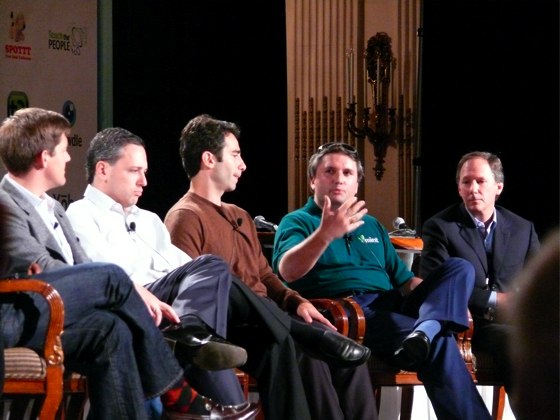Live from downtown San Francisco we’re live blogging a panel discussion many, many startups out there will be interested in: Getting Funded.
Jason Calacanis moderates the discussion with Jay Adelson (Digg), David Sacks (Geni), Roelof Botha (Sequoia), Sumant Mandel (Clearstone), George Zachery (CRV), Hank Barry (Howard Rice), and Jeff Clavier (SoftTechVC).
Spotty Wifi, but we’ll try again.
Q: how do companies raise funding A: contact is important, getting mobbed in conference works, but recommendations also good
Q: What about email? A: Sequoia reads every single email that comes in, without fail..”the door is always open for business”
Q: to Jay Adelson, what’s your approach to raising capital A: depends on the business, there are different groups of people that need to be known to obtain introductions, the key is networking with in the correct group…..For Digg, the pitch was a one page brief
JeffClavier: a combination of things, figure out how to crystallize the scope of your initial product from the start.
Q: with Ning, how did you value it A: best valuations come from ppl who know you the best, the also need to know that you can execute your vision
.
Q: there is a limited number of top notch entrepreneurs out there, do you target these folks A: ppl in the company are the number one consideration. Emotion does play some role, although not always the best role, but it does help to like the company
Q: how are robust valuations affecting the market?, big guys are doing Angel now as well A: it’s a good time to make efficient use of capital. There are also deal flows, companies that turn away funding often refer others.
Announcement of Softbank fund, see our post here.
Q: is there funding opportunities for content/ media buisniesses A: yes, not traditionally but this is changing
Q: Lots of talk about funds, big valuations, are angel networks annoying, stealing business A: yes, but competition is always good and the market system works, which is great for startups
Q: stellar background, what to do without it A: it’s not necessary, but obviously it helps. A great pitch with a great product overcomes the background of the team.

Q: do you fund non-US companies? A: yes, don’t do anything you wouldn’t ordinarily do, even if an investor tells you to. The scope of business is becoming global, traffic is there. Only hold back is the travel for board meetings.
Jason Calacanis thinks that people wont get ahead if they’re not in a major city. Jay Aldesen thinks it helps to be close to where the money is.
Money flows better internationally than people…Jason Calacanis interjects with “if you’ve got the reputation”…panel members shake heads.
Jay: Unless extreme alignment, be wary of strategic investments
Finding money: you can see 10 firms in one day on SandHill Road, do it, it’s expected that you’ll visit more than one source.
Rolof (Sequoia): sometimes there is value in strategic investments.
Distance question again: Austin Texas to far? Not for Sequoia.
Things startups shouldn’t do: don’t bring a lot of ppl to the meetings with the VC, 1 or 2 people and be focused on discussion.
Use the 12 slides model, available on VC websites (??), short story: it’s the info the funds are looking for.
People should also be on time to meetings.
Sequoia always has door open, they’ve said no to startups then they’ve come back 9 months later and have been funded.
Ask VC’s why they’ve said no, they will usually let you know.
Final question: how to connect without having gone to Stanford A: we will look at companies, the deal flow could come from anywhere. Try to build your product.